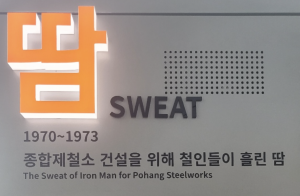Pohang: POSCO Museum
Photo essay of wall text of POSCO Museum of Pohang

Photo essay of wall text of POSCO Museum of Pohang

XXX

Emergency response is addressed in terms of post disaster investigations rather than immediate on scene response. The political and social analysis of these city areas, as well as the social aspects of the disasters are analyzed. Discussing why the events occurred, how to prevent them, as well as the political aspects such as power and public factors are also discussed. Investigations mainly showed that more needed to be done in terms of preventatives and safety that could have possibly minimized the amount of disaster in some of the situations.
This article discusses the French laws and their effect on immigration and healthcare. The laws around the retention of illegal immigrants in France to get treated for their illnesses are discussed. Policies are also discussed in comparison with America and other western nations. The law that is behind this was published in June 1997 by Jean-Pierre Chevenementthe. The public health aspects as well a immigrant rights are also discussed.
This program, as mentioned earlier is set in Tulane University in New Orleans yet has a lot of global outreach. This program's website has a map showing their direct partners all over the world on the front page. Partners include, Tulane University, RAND Gulf States Policy Institute, Louisiana State University,University of South Alabama, Louisiana Public Health Institute, Benadir University, Catholic Relief Services, dozens of colleges and programs in Africa such as the University of Zimbabwe as well as the Kinshasa School of Public Health, other partners includes UNICEF-Mali and others in Asia, such as Moi University and the Asian Disaster Preparedness Center. Needless to say these are just few of the many partners this program based out of Tulane has all over the world.
It was harder to find this information, but from what I gathered, the concept of national health insurance first became a topic of discussion during the Truman administration. From 1958 to 1964, controversies rose and a bill was drafted, specifically by who is unknown, but the signing of the act was part of Johnson's Great Society. Though names are not listed, it is said that those who previously worked on the King-Anderson Bill drafted this current Medicaid policy and that Wilbur Cohen, Assistant Secretary for Legislation of the Department of Health, Education and Welfare, really pushed for this Medicare bill.
Adriana Petryna has a PhD in Anthropology from UC Berkeley and teaches courses in this field at UPenn. She specializes in globalization and public health as well as medical anthropology. Her interests lie in Europe and the US, mainly the Chernobyl disaster. She centers her work on public and private forms of scientific knowledge production. She is very interested in the way science and technology play a role in the context of crisis.
This article has been cited in a few works, many having to do with Chernobyl or other nuclear disasters such as Fukushima. This reports has also been cited in numerous reputable journals as well as cited by numerous health organizations and experts on the topic. A lot of information from this report has been used to support other works reporting on Chernobyl.